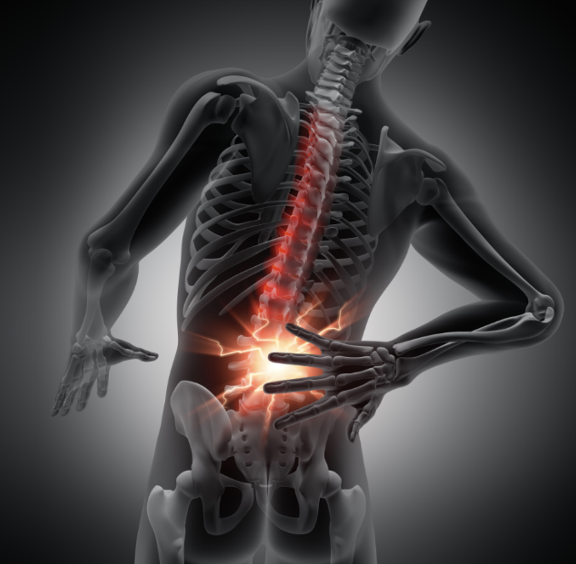Next to chronic diseases (diabetes, obesity, heart disease, etc.), the combination of musculoskeletal (MSK) pain and mental health issues is the greatest factor lowering quality of life and driving healthcare costs.
Research has shown that MSK pain greatly increases the risk for depression while depression can increase the intensity and severity of pain.
These effects fuel each other in a vicious circle, leading to a feedback loop known as the depression-pain dyad.
Traditional care for MSK pain and mental health issues treat the conditions separately, often ignoring the symbiotic relationship between the two.
A more effective approach is necessary. We need a solution that recognizes the importance mental health plays in overall health, especially in regards to MSK pain, and creates a holistic approach to treatment.
MSK Pain and Depression By The Numbers
The number of adults in the U.S. today suffering from MSK pain and/or mental health issues is staggering. Let’s begin with the statistics for MSK pain:
- 1 in 2 American adults have a musculoskeletal condition (126.6 million)1
- People with 2 or more MSK complaints are 6 times more likely to experience depression2
- MSK problems cause $213 billion in healthcare and lost wages annually
- 18% of all healthcare visits are related to MSK conditions3
The state of Americans’ mental health isn’t any better. While COVID-19 has increased nationwide mental health issues, even before the pandemic the numbers were high:
- Currently, 1 in 4 people in the U.S. are experiencing symptoms of depression4
- Between 2017 – 2018, at least 19% of adults reported experiencing mental illness
- In 2019, 51.5 million adults (20%) experienced some form of mental illness5
In the workplace, these combined conditions greatly impact job performance and healthcare utilization:
- 60% of employees with depression report impairment6
- 40% of sick days are used for mental health issues7
- Employee treatment for depression costs more than $2,000 per year8
- Employee treatment for chronic pain is more than $2,300 per year8
- MSK conditions account for 31% of work absenteeism9
Separately, the numbers for MSK pain and mental illness are at crisis level. Taken together, they highlight the enormous challenge facing healthcare professionals, employers, and insurance providers to find a solution that addresses the problem as a whole.
The Link Between MSK Pain and Depression
Depression and chronic pain act on the same neural pathways and affecting the same brain regions.
65% of people experiencing depression also have chronic pain. On the flip side, of the people suffering from chronic pain, about 27% also experience depression.
This is the depression-pain dyad and only further highlights the need to not only treat chronic pain; mental health must also be treated. You can’t have physical health without mental health, especially in regards to chronic pain.
So what is the best course of action that is effective for patients’ well-being while cutting healthcare costs?
A Digital Solution to MSK Pain And Mental Health
More and more studies are finding that physical, emotional and mental health are intertwined. Nowhere is this more pronounced than in the interaction between MSK pain and depression.
This has led to a realization by health and benefit execs at leading companies that comprehensive, whole-health solutions are the only way to effectively improve the quality of life for their employees while reducing disability claims, work days missed, and healthcare utilization.
The old ways of relying solely on prescribing pain medications, physical therapy, and mental health counseling are outdated – but a new way forward exists.
Forward-thinking employers are looking for new ways to address population health and lowering healthcare costs.
They are finding that digital health solutions like the behavioral change platform created by Album Health to be the answer.
Album Health’s innovative behavioral change system is the only health monitoring system that is evidence-based, whole-health focused, and human led. We combine real-time biometric data, clinically validated methods, and active coaching to help clients improve both physical and mental health.
From managing chronic conditions, MSK pain, and healthy lifestyle changes to mental health improvement and emotional support, Album Health is with you all the way creating better health and reducing healthcare costs.
2 Bair MJ, Robinson RL, Katon W, Kroenke K. Depression and Pain Comorbidity; A Literature Review. Arch Intern Med. 2003; 163(20): 2433–2445. doi:10.1001/archinte.163.20.2433.
3 Tainya C. Clarke, M.P.H., Ph.D., National Center for Health Statistics; Richard L. Nahin, M.P.H., Ph.D., National Institutes of Health; Patricia M. Barnes, M.A., National Center for Health Use of Complementary Health Approaches for Musculoskeletal Pain Disorders Among Adults: United States, 2012
4 https://www.cdc.gov/nchs/covid19/pulse/mental-health.htm
5 https://www.nimh.nih.gov/health/statistics/mental-illness.shtml
6 Kessler RC, Berglund P, Demler O, Jin R, Koretz D, Merikangas KR, et al. The epidemiology of major depressive disorder: Results from the National Comorbidity Survey Replication (NCS-R) JAMA : the journal of the American Medical Association. 2003 Jun;289(23):3095–3105.
7 Sado, M., Shirahase, J., Yoshimura, K., Miura, Y., Yamamoto, K., Tabuchi, H., Kato, M., … Mimura, M. (2014). Predictors of repeated sick leave in the workplace because of mental disorders. Neuropsychiatric disease and treatment, 10, 193-200. doi:10.2147/NDT.S55490.
8 Greenberg, PE et al.; The Economic Burden of Adults With Major Depressive Disorder in the United States (2005 and 2010). J Clin
Psychiatry 2015;76(2):155–162.
9 Clinical Corner: Impact of Musculoskeletal Disorders to Productivity, Costs


